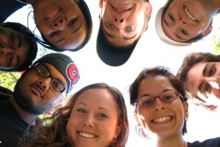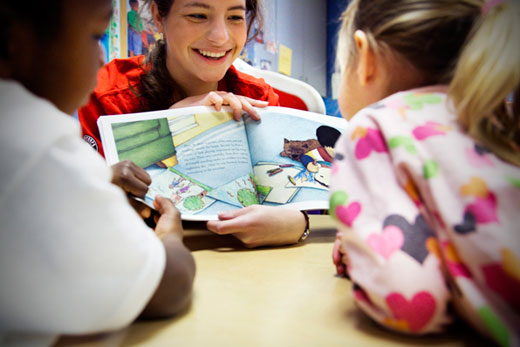This fall, Emory students will feel the impact of a new campus-wide initiative designed to help shape graduates into not only scholars, but also leaders.
Recognizing that students learn from different experiences throughout their college lives, Leadership Emory is an initiative launched through the Division of Campus Life and the Office of Student Leadership and Service (OSLS) to help unify leadership development in a new, focused direction.
From training, peer support and coaching to collaborative partnerships in the classroom, the program will emphasize the important link between ethical leadership and civic engagement.
"Through orientation and outreach, students will see and learn what Emory and Campus Life believe about leadership, what we think is important, what we hope they’ll be getting from their time at Emory, and the resources to better help them take charge of their own development," says Matt Garrett, interim director of OSLS.
Not only has the program earned national recognition for its scope and innovation in its pilot phase — named Outstanding Leadership Spotlight Program of the Year by the National Association of Student Personnel Administrators — it has the potential to become a signature component of the Emory experience, according to Garrett.
"We know students are learning about leadership throughout their entire experience," he says. "The main driving force is for us to help students connect those leadership experiences and to help them put together the pieces that can make them the most effective leaders possible moving forward."
Leadership that creates positive change

The program aspires to help students embody five core tenets by the time each one receives a diploma. Courtesy Leadership Emory.
.At its core, Leadership Emory "is about ethical leaders who work for positive transformation in the world," Garrett says.
The program aspires to help students embody five core tenets by the time each one receives a diploma:
• Awareness of self and empathy with others
• Ethical leadership principles and practices
• Collaboration and problem solving
• Shared commitment to action
• Ethical engagement and citizenship
Emory students and administrative units will begin to see those tenets woven into their campus experience in a variety of ways, according to Jill Camper, assistant director for OSLS.
Varsity athletes may use them as a team-building tool. The Career Center may employ them to help prepare graduating seniors for interviews. Ultimately, the tenets may even be used as a framework to develop a Leadership Certificate or an academic minor in leadership studies.
With plans to phase in the program over the next five years, the OSLS has developed a "common language" for leadership training that aligns with Emory’s mission and vision — an important step, says Bridget Guernsey Riordan, dean of students.
"With a great unifying language, we can say, whether you’re president of a fraternity or captain of a tennis team or an RA (resident advisor), we can help you find the opportunity to grow as a leader," she explains.
While leadership opportunities have always existed at Emory, "this is more intentional and organized and unifying," Riordan adds. "It gives leadership more of an academic focus."
Inspired by Oxford College leadership program
The foundation for Leadership Emory was inspired by elements of the Pierce Institute for Leadership and Community Engagement and Bonner Leaders Program at Emory’s Oxford College, where a Leadership Oxford program has been training student leaders since 1988.
And the program is gathering momentum. Staff from across campus have attended workshops on how to incorporate leadership language into existing programs, with more planned this summer. This semester, a faculty steering committee begins to consider how to incorporate that language into curricular courses.
Last month, over 80 Emory students and staff gathered on campus for the second annual Leadership Emory Summit. The free daylong program focused on topics such as developing a leadership vision by understanding your personal values, mindfulness, how to market your leadership experience, and coping with change and transition.
"Each presentation was tied to a tenet, really the first Leadership Emory Summit where we had used them, to get people’s feet wet," Camper says.
"Last year, we were trying to see if this was something students were interested in, and we found that it definitely is," she adds. "That says so much about Emory students — they get excited about these opportunities and take advantage of them."
Carol Ross, a senior in Middle Eastern studies, initially had mixed feeling about attending the summit. As a co-director of Volunteer Services at OSLS, she has "been through a lot of leadership development programs; I thought it would be the same old thing."
But not only did she find the program engaging, she is pleased at the direction that she sees Leadership Emory heading.
"I see a deepening understanding between the meaning and the significance of leadership," Ross says. "In my own life, I’m really focused on service and social justice —I think that’s the way genuine leadership really happens."

